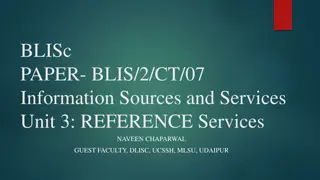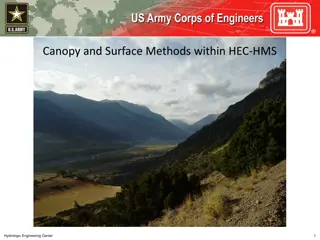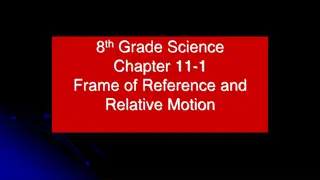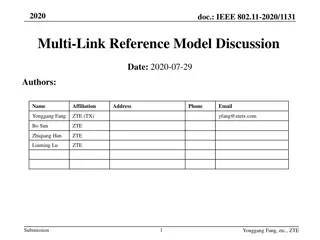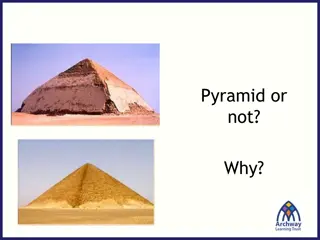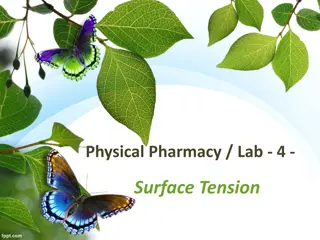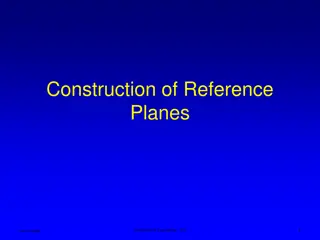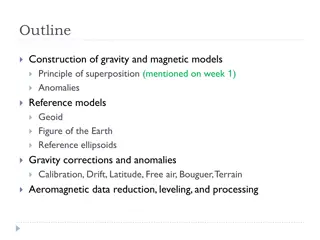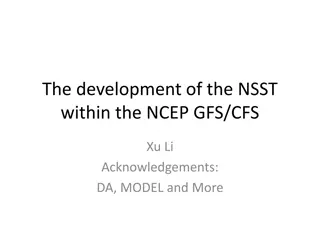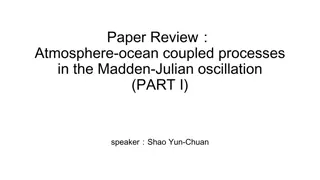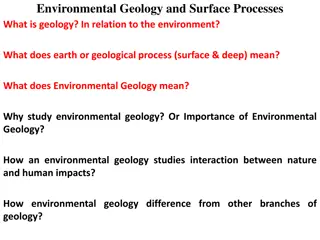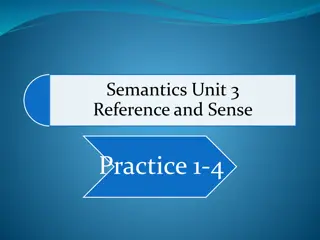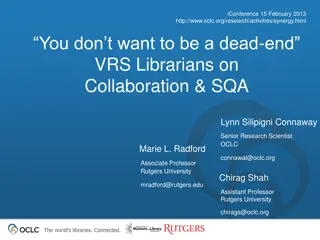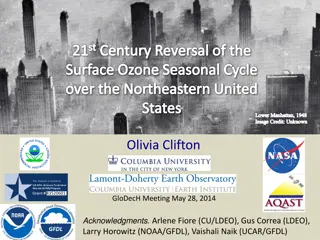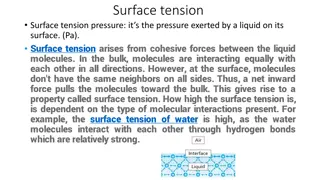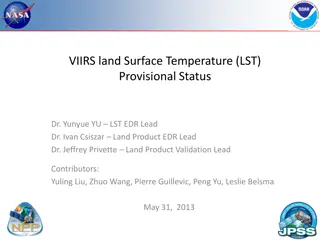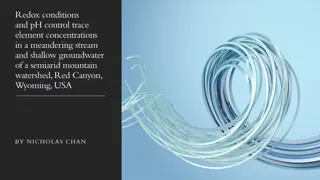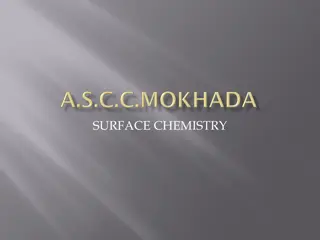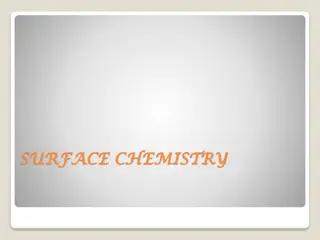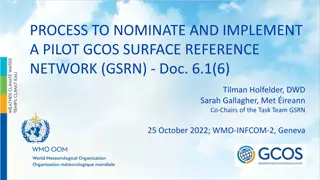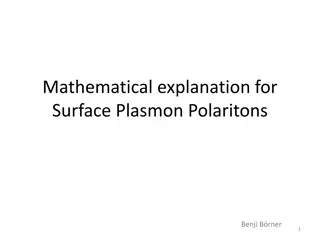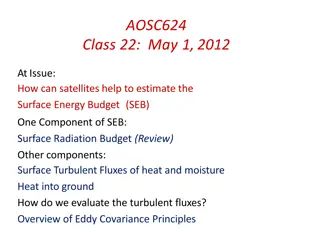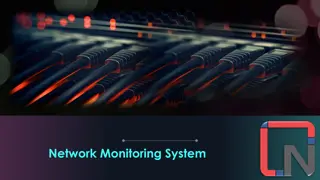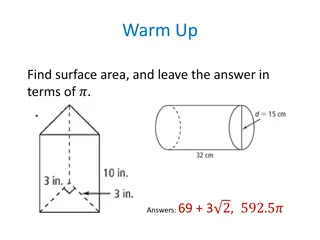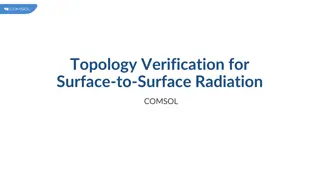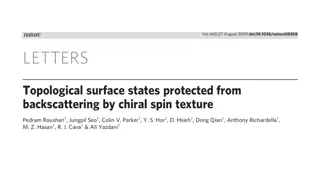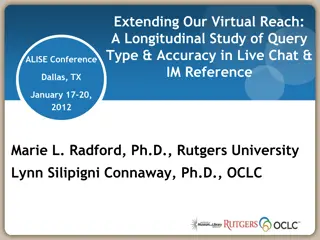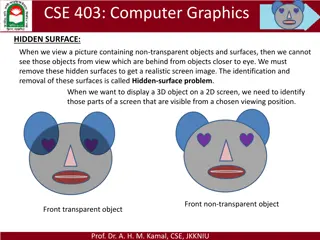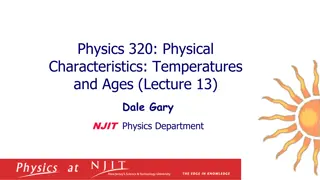Exploring Surface Tension and Wettability in Nature
Discover the fascinating world of surface tension and wettability through engaging experiments and observations, from water cohesion on a penny to the microscopic structures on lotus leaves. Delve into the role of cohesion and adhesion, surface wettability factors, and everyday applications of these
2 views • 17 slides
Understanding Surfaces and Interfacial Energy in Chemistry
Surfaces play a crucial role in free energy and dissolution processes, impacting surface tension and interfacial energy. Learn about the adsorption of molecules, surface excess properties, and the contributions of surface area and curvature to surface energy. Dive into concepts such as Laplace's equ
6 views • 71 slides
Importance of Reference Services in Libraries
Reference services in libraries play a crucial role in connecting users with the information they need, promoting the use of library collections. This service assists users in various queries and requests, ranging from simple fact-finding to complex research. Reference functions include responsive s
1 views • 19 slides
Understanding Canopy and Surface Methods in HEC-HMS
Explore the various canopy and surface methods utilized in HEC-HMS for managing water resources. Learn about canopy interception, evapotranspiration, common parameter values, and factors affecting losses. Delve into available methods, canopy storage values, and surface depression storage. Enhance yo
0 views • 12 slides
Understanding Motion: Frames of Reference and Relative Motion
Motion is defined as a change in position over time. To describe motion accurately, one needs to understand frames of reference and relative motion. Frames of reference are systems of objects used to determine if something is in motion, while relative motion involves movement in relation to a refere
3 views • 14 slides
Understanding Runoff in Surface Water Systems
Runoff, the flow of precipitation and other contributions in surface streams, plays a crucial role in watershed systems. It encompasses various sources such as surface runoff, interflow, and base flow. Surface runoff, which travels over the ground surface to channels, is influenced by factors like s
1 views • 27 slides
Network Slicing with OAI 5G CN Workshop Overview
Overview of Network Slicing with OAI 5G CN workshop focusing on the crucial role of network slicing in realizing the service-oriented 5G vision. This workshop covers topics like multiple logical networks creation on shared infrastructure, different types of network slices, preparation and instantiat
1 views • 6 slides
IEEE 802.11-2020 Multi-Link Reference Model Discussion
This contribution discusses the reference model to support multi-link operation in IEEE 802.11be and proposes architecture reference models to support multi-link devices. It covers aspects such as baseline architecture reference models, logical entities in different layers, Multi-Link Device (MLD) f
1 views • 19 slides
Understanding Ocean Currents and Effects
Ocean currents play a crucial role in the movement of water across the Earth's surface. Wind-driven surface currents, influenced by the Coriolis effect, move water horizontally and impact climate patterns worldwide. Major currents extend deep below the surface and can move rapidly, while rip current
0 views • 14 slides
Exploring Surface Area in Mathematics
Delve into the concept of surface area as an essential mathematical topic, understanding its significance in everyday life and its application in various 3D shapes. Learn how to calculate surface area for different space figures like prisms and pyramids through step-by-step methods. Engage with esse
6 views • 21 slides
Exploring Pyramid Geometry for Surface Area Calculations
Delve into the concept of surface area calculations for pyramids, ranging from identifying fake pyramids to determining the surface area of iconic structures like the Great Pyramid. Learn about the essential information needed, such as base length and slant height, to derive accurate measurements. D
0 views • 32 slides
Understanding Surface Tension in Physical Pharmacy Lab
Surface tension is a crucial concept in physical pharmacy lab dealing with gas-solid or gas-liquid interfaces. It refers to the force per unit length required to balance the inward pull on the surface. Interfacial tension, cohesive forces, and adhesive forces play significant roles in determining su
0 views • 16 slides
Introduction to Construction of Reference Planes in Engineering
Explore the process of constructing reference planes in engineering, including principal planes, creating reference planes, reference features, and how to uniquely define a plane. Reference planes are essential for creating new sketches and carrying out feature operations in engineering design.
0 views • 12 slides
Understanding Gravity and Magnetic Models in Geophysics
Construction of gravity and magnetic models involves principles of superposition to isolate anomalies, reference ellipsoids, geoid, and various corrections like drift, latitude, free air, Bouguer, and terrain corrections. Gravity anomalies are determined by subtracting multiple factors from observed
0 views • 15 slides
Understanding Near-Surface Sea Temperature Development in NCEP GFS/CFS
This informative piece delves into the evolution of Near-Surface Sea Temperature (NSST) within the NCEP GFS/CFS, discussing its significance in Numerical Weather Prediction (NWP) systems, the utilization of sea surface temperature (SST), and the T-profile near the sea surface. It covers the role of
0 views • 28 slides
Understanding Atmosphere-Ocean Coupling in Madden-Julian Oscillation
Atmosphere-ocean coupled processes in the Madden-Julian Oscillation (MJO) play a crucial role in intraseasonal oscillations. This paper review by Shao Yun-Chuan explores how the ocean's Sea Surface Temperature (SST) influences surface fluxes, MJO convection, and energy balance dynamics. It delves in
0 views • 17 slides
Understanding Inertial and Non-Inertial Frames of Reference
Frames of reference play a crucial role in describing and observing motion. In physics, there are two main types of frames of reference: inertial and non-inertial. An inertial frame is one that moves at a constant velocity, where Newton's first law holds true. Such frames have specific characteristi
0 views • 14 slides
Understanding Environmental Geology and Surface Processes
Geology in relation to the environment involves studying Earth's geological processes, both surface and deep, and their impacts on nature and human activities. Environmental geology focuses on the interaction between humans and the Earth's near-surface environment, addressing hazards like erosion, f
0 views • 71 slides
Understanding Semantics: Reference and Sense Explained
Explore the concepts of reference and sense in semantics through examples and practice questions. Learn how language expressions refer to things in the world and understand the distinction between the referent and the reference. Delve into variable and constant reference with practical scenarios to
0 views • 8 slides
Insights on Virtual Reference Services and Collaboration in Libraries
Explore the findings from interviews with VRS librarians regarding collaboration, difficult reference encounters within and outside librarians' expertise, and the importance of sustainable collaboration between Virtual Reference and Social Q&A sites for creating new library services. The research fo
0 views • 11 slides
Enhancing Reference Services: Skills and Guidelines for Library Professionals
Explore the essence of conducting reference interviews, understanding the advantages and disadvantages, essential personal and interpersonal skills, and guidelines for behavioral performance in providing reference and information services. Delve into the remote reference service concept, the integra
0 views • 23 slides
Surface Ozone Seasonal Cycle Reversal Study in Northeastern United States Lower Manhattan
Study on the reversal of the surface ozone seasonal cycle over Northeastern United States Lower Manhattan, analyzing the impact of NOx and VOC emissions on Surface O3 levels. Research shows a 26% decrease in regional NOx emissions leading to changes in the seasonal cycle of surface ozone concentrati
0 views • 24 slides
Understanding Surface Tension in Physical Pharmacy Lab
Surface tension is a critical aspect in physical pharmacy lab experiments, involving the study of forces at gas-solid or gas-liquid interfaces. It is the force per unit length required to counterbalance the net inward pull on a surface. The concept extends to interfacial tension, cohesive and adhesi
0 views • 21 slides
Understanding Surface Tension: Properties, Measurement Methods, and Calculations
Surface tension is the pressure exerted by a liquid on its surface due to cohesive forces among molecules. The measurement methods include the liquid rise in a capillary tube technique, drop weight method, and bubble pressure method. The surface tension coefficient can be calculated using the equati
0 views • 12 slides
Understanding Reference and Inference in Linguistics
Discussing deixis, the act of reference in language is explained as a way for speakers and writers to enable listeners and readers to identify entities. Reference involves using proper nouns, phrases, pronouns, and even invented names. Inference plays a crucial role in successful acts of reference,
0 views • 11 slides
VIIRS Land Surface Temperature (LST) Calibration Approach and Data Analysis
The VIIRS Land Surface Temperature (LST) Provisional Status project, led by Dr. Yunyue Yu, focuses on improving the LST EDR through algorithm coefficient updates and calibrations. The calibration process involves regression steps and comparisons with reference datasets like MODIS Aqua LST. Various c
0 views • 29 slides
Redox Conditions and pH Control in a Mountain Watershed: Study in Red Canyon, Wyoming, USA
Exploring redox conditions and trace element concentrations in a semi-arid mountain watershed, this study in Red Canyon, Wyoming, delves into the impact of oxic surface water and anoxic groundwater on trace element cycling. The investigation aims to enhance understanding of seasonal variabilities, f
0 views • 11 slides
Understanding Surface Chemistry and Adsorption Phenomena
Surface chemistry is a crucial branch of chemistry that focuses on the chemical processes occurring at interfaces between different surfaces like solid-liquid, solid-gas, and liquid-gas. This field plays a significant role in various industries, including electronics. Adsorption, absorption, and sor
0 views • 15 slides
Understanding Surface Chemistry and Adsorption Phenomenon
Surface chemistry explores the interactions that occur at surfaces and interfaces, with adsorption being a key phenomenon. Adsorption involves the concentration of molecules on a surface, with adsorbents and adsorbates playing crucial roles. Desorption, the opposite process, removes adsorbed substan
1 views • 21 slides
Establishment of GCOS Surface Reference Network (GSRN) Pilot Phase
The establishment of the GCOS Surface Reference Network (GSRN) Pilot Phase aims to improve the accuracy, stability, and comparability of surface observations for Essential Climate Variables (ECVs). The GSRN will serve as the reference network for surface observations, providing data traceability and
0 views • 7 slides
Changes in Viscose Fabric Surface Morphology Due to Sunlight Exposure
This study explores the impact of sunlight exposure on the surface morphology of viscose fabrics. Direct exposure to sunlight for 120 days during summer showed significant changes in fiber surface depressions. The observed damage in mechanical properties correlated with alterations in surface morpho
0 views • 11 slides
Mathematical Insights into Surface Plasmon Polaritons
This mathematical explanation delves into the intricacies of surface plasmon polaritons, covering Maxwell's equations, wavenumbers, bulk and surface plasmon-polariton formulations, medium considerations, excitation conditions, losses, and matching examples with air, gold, and sapphire prisms. Detail
0 views • 13 slides
Satellite Applications in Estimating Earth's Surface Energy Budget
Satellites play a crucial role in estimating the Surface Energy Budget (SEB) by providing data on various components such as Surface Radiation Budget and Surface Turbulent Fluxes. The SEB includes factors like net radiation flux, sensible and latent heat fluxes, and subsurface heat transfer. Satelli
0 views • 38 slides
Enhancing Network Stability with Network Monitoring Systems
Network monitoring is crucial for efficient management and proactive issue detection in a network environment. Factors influencing an effective network system include choosing the best OEM, SLA agreements, and selecting a reliable System Integrator. Reactive monitoring can lead to financial losses a
0 views • 12 slides
Geometry Concepts for Surface Area Calculations
Explore various geometric shapes such as pyramids and cones to calculate surface area. Learn the differences between prisms and pyramids, understand the importance of altitude and slant height in pyramids, and differentiate between lateral and surface areas. Practice finding lateral and surface area
0 views • 16 slides
Surface-to-Surface Radiation Verification and Boundary Detection in COMSOL
Explore the verification of surface-to-surface radiation setups in COMSOL, detecting incorrect radiation configurations with nonradiating boundaries. Learn how to identify and resolve nonradiating boundaries, ensuring accurate and effective radiation simulations. Discover the importance of selecting
0 views • 10 slides
Surface Analysis of STM Bi0.92Sb0.08(111) with Spectroscopic Techniques
Explore the surface properties of STM Bi0.92Sb0.08(111) using advanced spectroscopic methods such as dI/dV mapping, QPI patterns, JDOS, SSP, Spin Selection Probability, ARPES, FT-STS, charge inhomogeneity, scattering of surface states, and spatial fluctuations of momentum. The images provide a detai
0 views • 10 slides
Extending Our Virtual Reach: Longitudinal Study of Query Type & Accuracy in Live Chat & IM Reference
This study, conducted from 2004 to 2010, explores different types of virtual reference questions such as Subject Search, Ready Reference, and Procedural inquiries. It discusses the evolution of virtual reference services and the accuracy of responses in live chat and instant messaging. The research
0 views • 33 slides
Hidden Surface Removal in Computer Graphics
In computer graphics, the hidden-surface problem refers to identifying and removing surfaces that are not visible in a given view to create a realistic screen image. Different methods like Depth Buffer (Z-Buffer) and Scan-Line are used to address this issue by determining the closest visible surface
0 views • 14 slides
Understanding Surface Temperatures and Albedo in Planetary Systems
Surface temperatures and albedo play significant roles in understanding planetary characteristics. Albedo, the fraction of sunlight reflected from a planet's surface, varies among planets. By considering factors like albedo, distance from the Sun, and energy flux, we can estimate surface temperature
0 views • 10 slides


